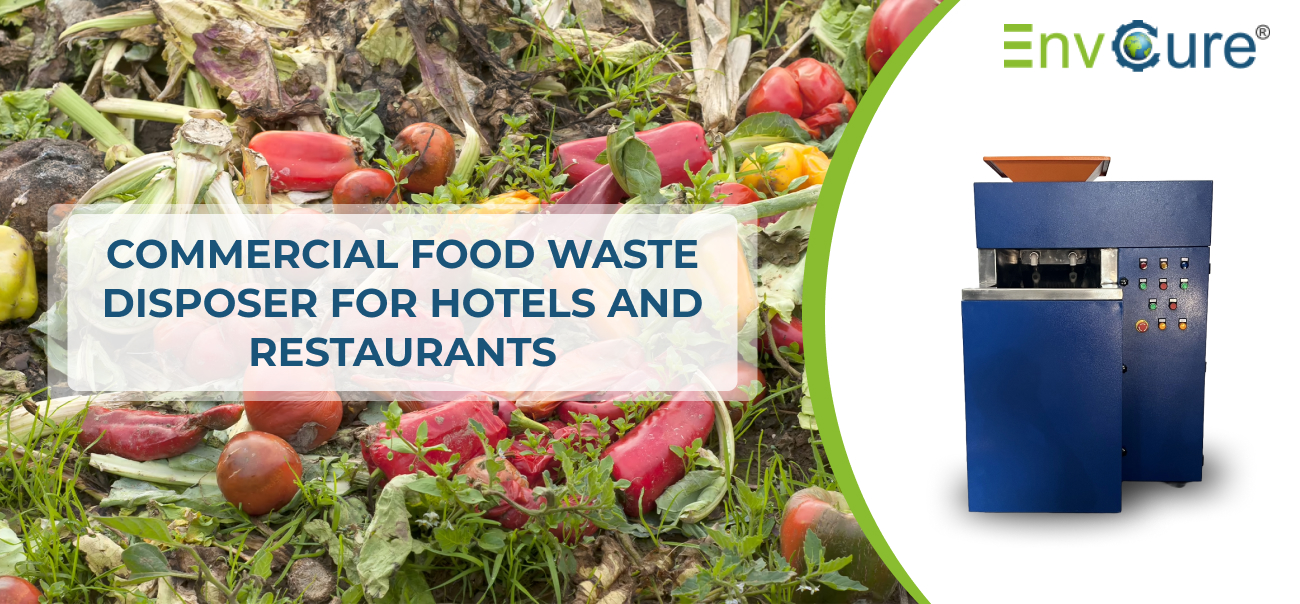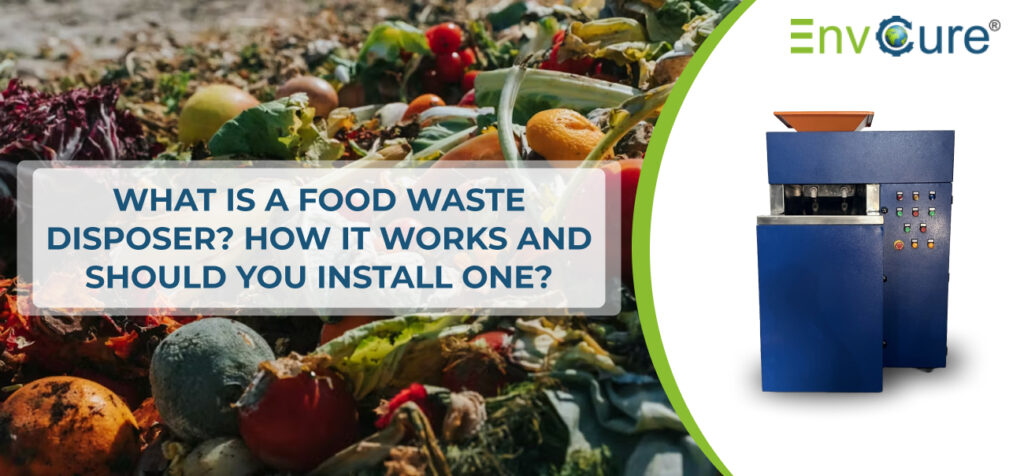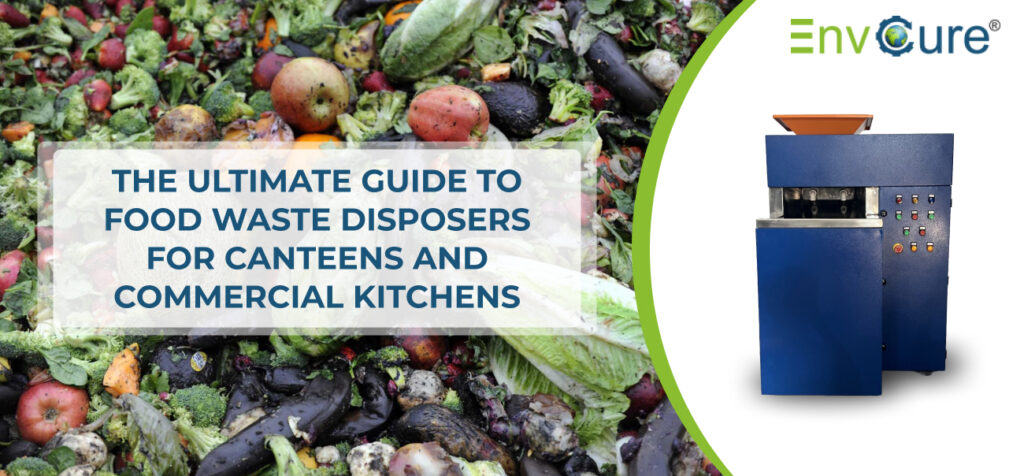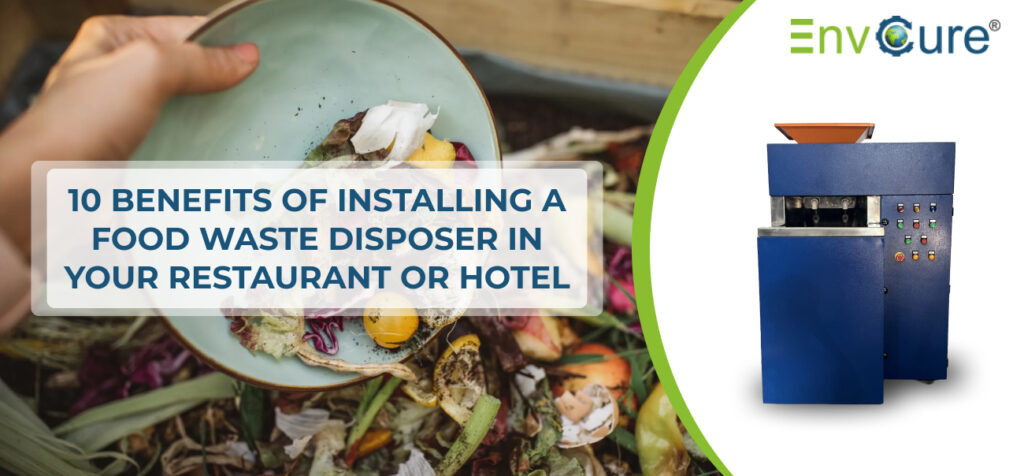Hotels and restaurants generate substantial food waste daily, creating challenges for hygiene, cost, and sustainability. A food waste disposer grinds scraps into smaller pieces for disposal or recycling. The mechanics of commercial food disposers, and benefits to hospitality businesses are discussed. Find out how EnvCure Technocrat LLP’s kitchen waste solutions create cleaner, greener kitchens.
Overview: Food Waste Disposer
- What is it?: A food waste disposer grinds food scraps into small particles for hotels and restaurants.
- Key Benefits: Waste volume reduced, hygiene improved, disposal costs reduced and eco-friendly practices supported.
- Applications: Ideal for large kitchens in hotels, restaurants and catering services.
Understanding the Food Waste Disposer
A food waste disposer is also called a food waste crusher or kitchen crusher. It grinds food scraps like vegetable peels, meat bones and leftovers into fine powder, installed under sinks. These particles are flushed through plumbing or processed for composting reducing waste volume. Unlike residential models, industrial food disposers can handle high volumes of waste with robust motors and blades. Key features include:
- High-Powered Motors: Pick up tough material like bones and fibrous vegetables.
- Stainless Steel Components: Stable, resistant to corrosion.
- Automatic Operation: Safety features make use simpler in busy kitchens.
- Low Water Usage: Some models can save up to 70% water.
They simplify kitchen operations and are therefore essential equipment for hotels or restaurants wishing to remain hygiene and productive.
The Challenge of Food Waste in Hospitality
The hospitality industry produces about 1.3 billion tons of food waste per year, UN estimates. Hotels and restaurants face challenges like:
- High Waste Volumes: Buffets, banquets and catering leave lots of scraps.
- Hygiene Concerns: Food waste in dumpsters draws pests and creates odors.
- Cost Pressures: Waste disposal and landfill fees strain budgets.
A food waste disposer handles these issues by reducing waste volume, improving sanitation and supporting recycling or composting in line with eco-conscious hospitality trends.
Learn what factors to consider in our detailed guide on how to choose the right food waste disposer for your business.
How Commercial Food Disposers Work
An industrial food disposer handles food waste precisely in high-pressure kitchens. Installed beneath a sink or as a standalone unit, the machine processes food scraps in several mechanical steps. Here’s how it works:
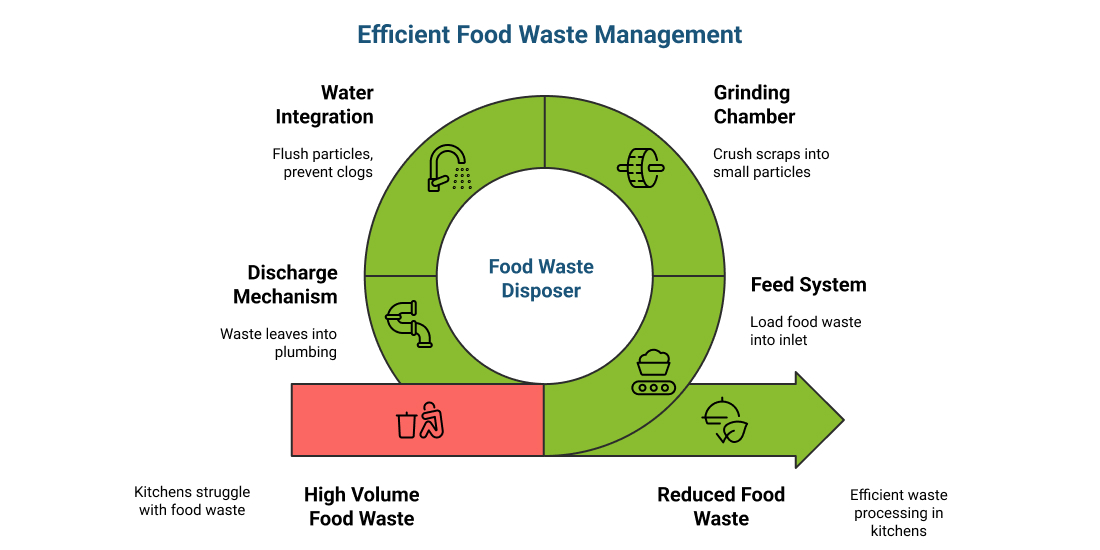
-
Feed System:
Kitchen staff load food waste like vegetable trimmings, meat scraps, or leftover plates into the disposer’s inlet. Some models use continuous feed for continuous processing while batch feed units process fixed amounts for safety.
-
Grinding Chamber:
On top of the machine is a high-torque motor driving a turning turntable or impeller with stainless steel blades or grinding rings. They crush food scraps to particles of 1-5 millimeters.
-
Water Integration:
Water flows through the chamber to flush the ground particles to prevent clogs and help with waste transport. Advanced models optimize water use systems save up to 70% compared to traditional disposers.
-
Discharge Mechanism:
Pulverised waste leaves the discharge pipe into the plumbing system (connected to a grease interceptor for compliance) or into a collection system for composting or waste-to-energy processing.
-
Safety and Control Features:
Modern kitchen crushers have overheating sensors, overload protection and automatic shut-off. Safe operation with touchless controls or foot pedals reduces risk of accidents.
The process takes seconds and lets kitchens handle large volumes of waste without interfering with workflow. So a food waste crusher in a hotel kitchen might process scraps from a 500-person banquet in less than a minute.
Benefits of Food Waste Disposers for Hotels and Restaurants
A food waste disposer gives hospitality businesses tangible benefits in terms of operation, financial and environmental terms:
- Significant Waste Reduction: Grinding food scraps into fine particles reduces waste volume up to 50%. This reduces space needed for waste storage and dumpster trips and thus hauling fees.
- Enhanced Kitchen Hygiene: Food waste left in bins attracts rats and flies and has unpleasant odors. A kitchen crusher removes this problem by processing scraps immediately in a cleaner and safer kitchen.
- Cost Efficiency: Reducing waste volume lowers disposal costs which can be up to 4% of an operating budget for a restaurant. Also, industrial food crushers reduce waste handling labor so staff can concentrate on food preparation and service.
- Operational Streamlining: Best kitchen waste disposer speeds cleanup. Staff need not do waste sorting or transport themselves. This is critical in high volume settings such as hotel buffets where guest satisfaction requires rapid waste management.
Using an industrial food disposer for example can save thousands of dollars annually on waste management while projecting a greener brand image to eco-conscious customers.
Applications in Hospitality Settings
The food waste disposer is adapted to hospitality waste challenges:
- Restaurants: High-turnover kitchens have continuous-feed kitchen crushers for various scraps including vegetable peels, meat trimmings and plate leftovers.
- Hotels: Large scale operations like buffets and room service produce different wastes. From fruit rinds to banquet scraps, industrial food crushers handle all hygiene standards and reduce landfill contributions.
- Biogas Plants: Crushed food waste is more productive than raw waste in terms of energy generation inputs for biogas Plants. That makes biogas plant owners and installation companies target customers of EnvCure for its food waste disposer solutions.
- Catering Services: Mobile and event caterers use compact commercial food disposers to process waste on site reducing cleanup time and transport. This is useful for outdoor/large events.
- Cafeterias: High throughput settings like hospital or university dining halls use food waste crushers to process thousands of servings daily.
- Food Trucks & Small Kitchens: Small waste volumes from compact kitchen waste solutions fit under tight countertops in space-constrained operations.
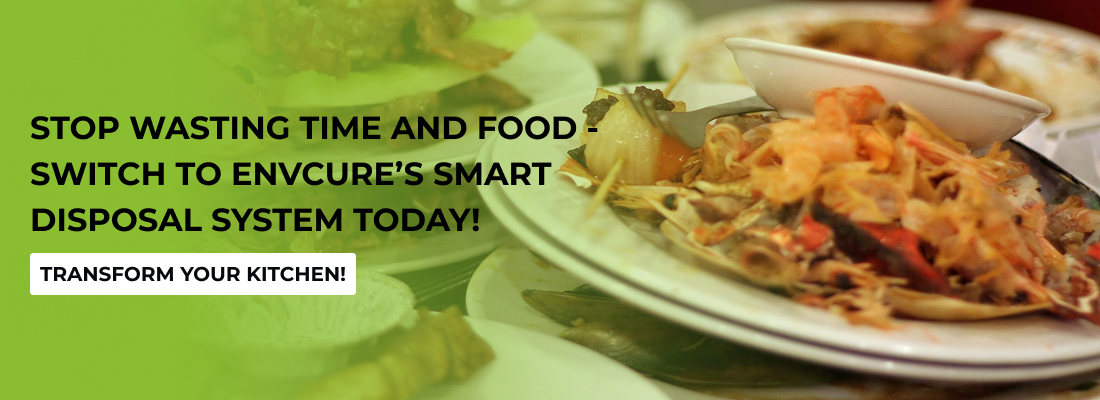
Partner with Envcure for Greener Kitchens
At EnvCure Technocrat LLP, we are redefining how food waste is managed across hotels, restaurants, and bio gas plants. Our food waste disposers simplify operations, lower costs and help the environment as you’ll read here. By integrating industrial food disposers into a hub-and-spoke content strategy we educate & engage businesses on the value of our kitchen waste solutions.
With global presence of over 1500 installations EnvCure Technocrat LLP brings you tailor made kitchen crushers. Are you upgrading your waste management? Find out more about our best kitchen waste disposers and request a consultation. Let’s build a cleaner, better kitchen together!
FAQs Related to Food Waste Disposer:
Q: What are the benefits of installing a commercial food waste disposer?
A: The benefits of installing a commercial food waste disposer are:
- Reduces kitchen waste volume
- Improves hygiene by preventing food waste build-up
- Saves space otherwise used for waste storage
- Reduces odor and pest problems
- Supports eco-friendly waste management
Q: How do I choose the right capacity for my business?
A: The capacity depends on your kitchen size, the number of meals served daily, and the type of food waste generated. Larger establishments require high-horsepower models for efficient performance.
Q: Can it handle continuous operation?
A: Yes. Many commercial models are designed for continuous feed, meaning you can keep adding food waste while the machine is running, which is ideal for busy kitchens.




